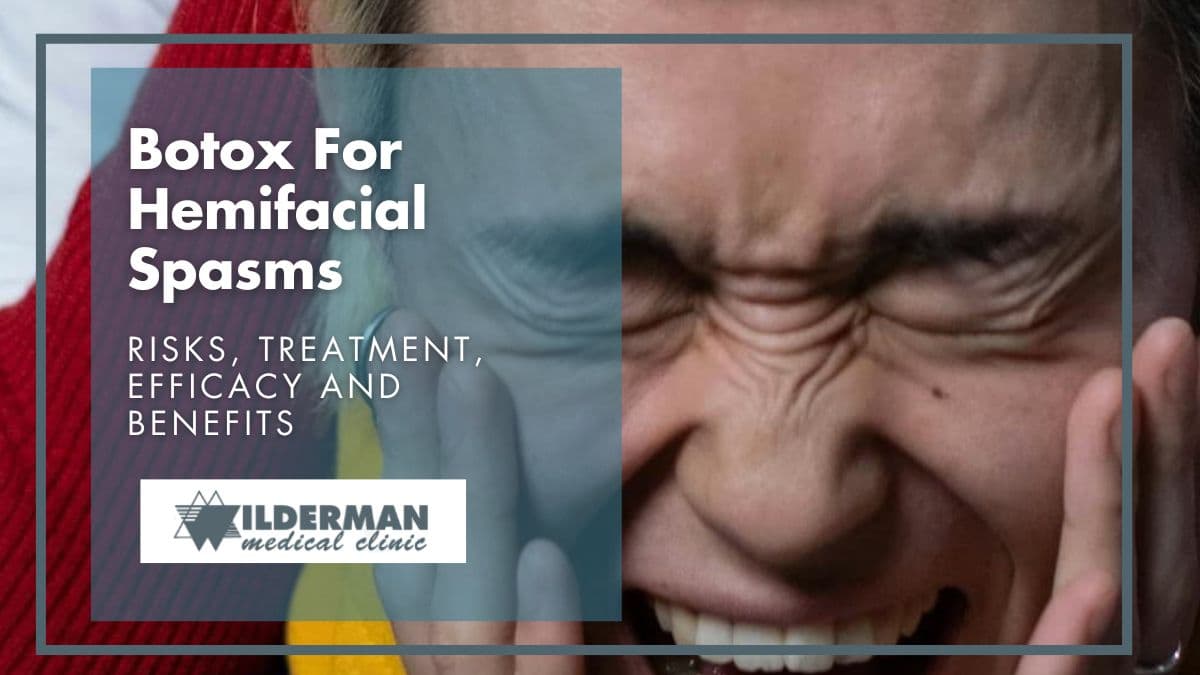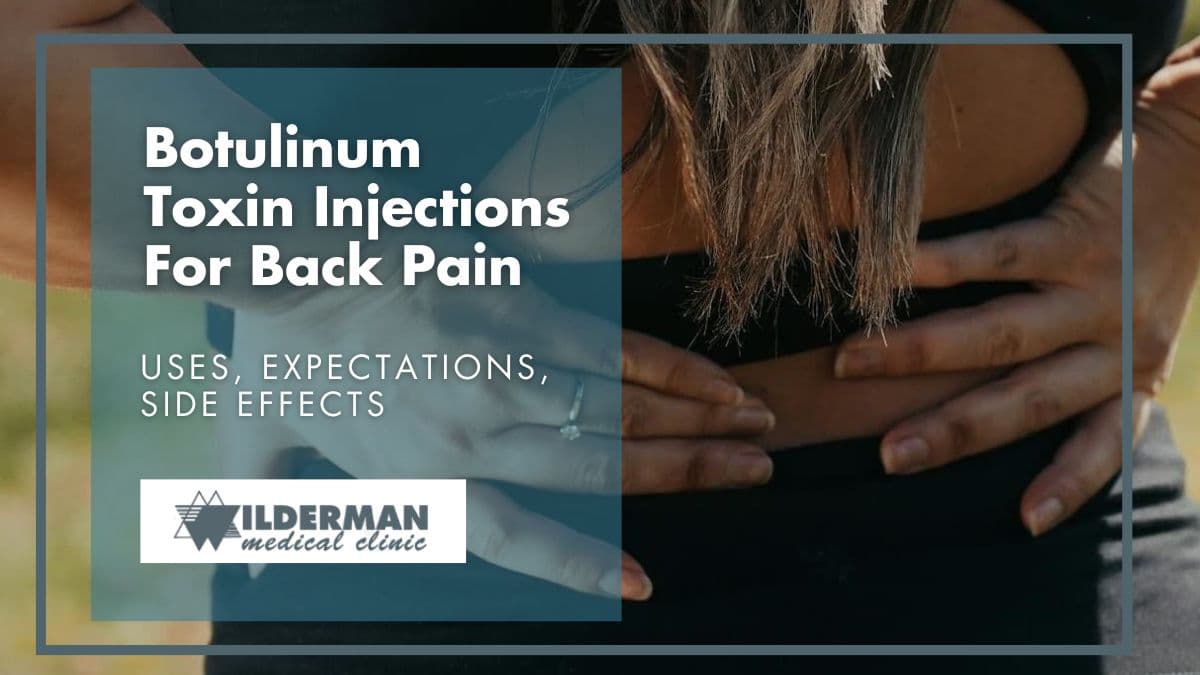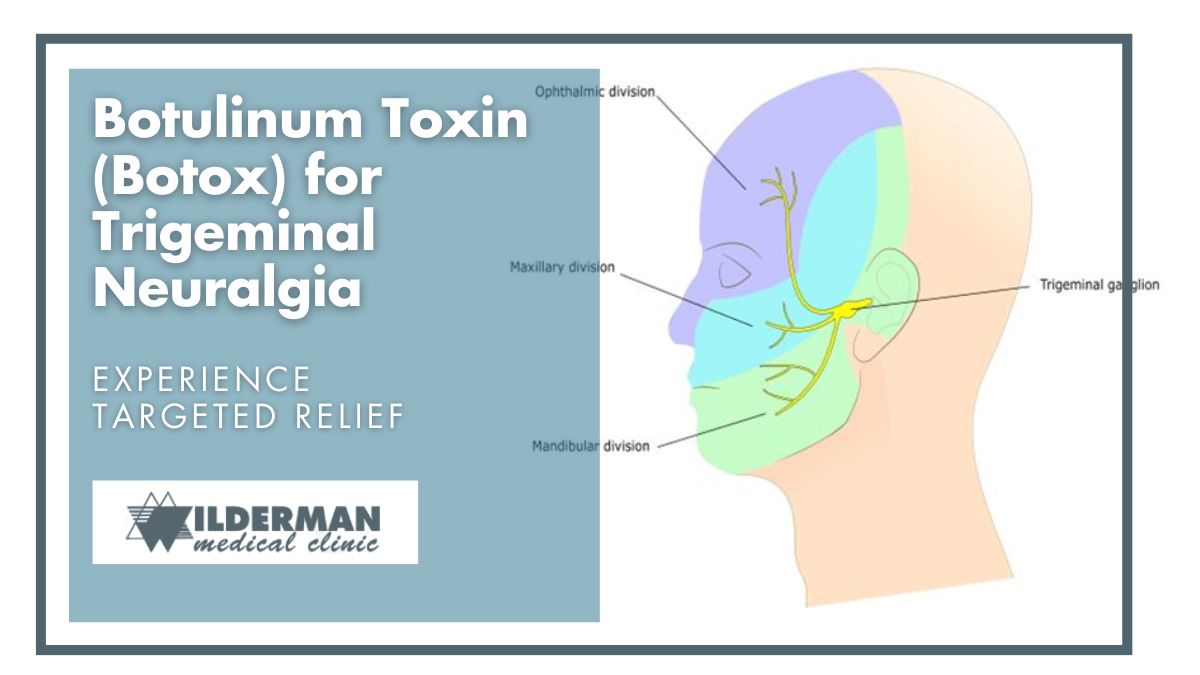Covered by OHIP?
Most services are covered by the Ontario Health Insurance Plan (OHIP)
Waiting Time
Your timeframe depends on the type of procedure.
OHIP Covered Services
Most services are covered by the Ontario Health Insurance Plan (OHIP)
WILDERMAN MEDICAL CLINIC
Botulinum Toxin For Depression
Depression is a serious mental health condition that can impact every aspect of your life, including work, relationships, and physical health.
For some, medications and psychotherapy can help, but up to 33% of patients continue to suffer from persistent low mood despite treatment. Recent studies have shown that Botulism toxin is a safe and effective option to improve mood and reduce depressive symptoms.
How Does Botulism Toxin Work to Treat Depression?
Botulism toxin, commonly known as Botox®, is widely known for its cosmetic use in reducing facial wrinkles. However, recent studies have uncovered its potential to reduce the symptoms of depressive disorder.
The mechanism behind this lies in the facial feedback hypothesis. This theory, dating back to Charles Darwin in the 19th century, suggests that the facial expressions we make send signals to the brain that influence our mood — and vice-versa. These signals create a feedback loop between our facial expressions and our emotions. When Botox® is injected into specific facial muscles, it temporarily paralyzes them, reducing the ability to frown.
Botulism toxin interrupts the ability to make negative facial expressions. This sends signals to the brain that can break the feedback cycle, elevate your mood, and reduce the symptoms of depression.
Benefits of Botox® for Depression
- Non-Traditional Approach: Botox® offers an alternative for those who have not found relief through conventional depression treatments like medications or therapy.
- Rapid Onset: Some patients report improved mood within just a few weeks of treatment. This can be significantly faster than antidepressant treatment with medication, which may take several months to become fully effective.
- Long-Term Results: The effect of a single treatment typically lasts three to four months. The exact length of its effects will vary from one person to another. Your medical team will determine the frequency of your treatments.
- Minimal Side Effects: When administered by a qualified professional, Botox® is generally well-tolerated. Most side effects are mild and temporary, such as localized pain, headache, or swelling at the injection site.
- Improved Quality of Life: By potentially alleviating depressive symptoms, Botox® can help you regain interest and pleasure in daily activities, enhancing your overall quality of life.
Is There Science Supporting Botox® for Depression?
Yes, multiple clinical studies have explored the efficacy of Botox® in treating depression. The results have been very encouraging.
A series of randomized, double-blind, placebo-controlled trials (the gold standard for medical research) published in 2020, found that patients treated with Botulism toxin in the chin and forehead showed significant improvement in their depression symptoms compared to the control groups. In some cases, the clinical improvement in depression outlasted the muscle-relaxing effect, suggesting that the facial feedback hypothesis may not be the only explanation for the positive effects of Botox® in treating depression.
Another scientific analysis of over 40,000 Botulism toxin treatments, published in the journal Scientific Reports in 2020, found that patients who received Botox® injections for conditions like migraine and facial wrinkles had a significantly lower number of depression reports compared to patients undergoing different treatments for the same conditions.
Numerous other recent scientific studies published in psychiatric and medical journals have described similar results.
The WMC team works to stay abreast of the current research, including performing studies in our own clinical trials department, to provide patients with the safest, most effective treatments possible.
What to Expect During Botulism Toxin Treatment for Depression
Choosing Botox® for depression at Wilderman Clinic involves several steps:
- Personalized Consultation: The process begins with a one-on-one consultation with a qualified healthcare provider. This session will involve discussing your medical history, current symptoms, and previous treatments. Your provider will determine if you are a suitable candidate for Botox® therapy.
- Procedure: If deemed appropriate, the Botox® injections will be administered in a clinical setting. The procedure is quick, typically taking about 10-20 minutes. Your provider will inject small amounts of Botox® into specific areas of the face.
- Post-Treatment: After the procedure, you may experience some minor discomfort at the injection sites. There is no downtime, and you can return to your normal activities immediately.
- Follow-Up: Your provider will schedule follow-up appointments to monitor your progress and assess the effectiveness of the treatment. Adjustments to the injection sites or dosage may be made based on your response.
Understanding Risks and Side Effects of Botox® for Depression
While Botox® is generally considered safe when administered by a trained professional, it is essential to be aware of potential risks and side effects:
- Common Side Effects: These can include localized pain, swelling, redness, or bruising at the injection site. These symptoms are typically mild and resolve within a few days.
- Rare Side Effects: In rare cases, individuals may experience headaches, flu-like symptoms, or temporary drooping of the eyelids or eyebrows. These effects are usually temporary and resolve on their own.
- Allergic Reactions: Although extremely rare, some individuals may have an allergic reaction to Botox®. Symptoms can include itching, rash, or difficulty breathing. Immediate medical attention should be sought if any of these occur.
- Psychological Considerations: As with any treatment for depression, it is crucial to maintain open communication with your healthcare provider. Monitor your mood and symptoms, and report any changes or concerns promptly.
Will this Botox® Treatment be covered by OHIP?
Botulism Toxin treatments for depression may not be covered by OHIP or private insurance plans. Our clinic staff will discuss payment options with you.
Transform Your Life With Botox® for Depression at Wilderman Clinic
If you or a loved one is struggling with depression and are seeking innovative treatment options, consider exploring Botox® at Wilderman Clinic as a potential solution. With its promising results and minimal side effects, Botox® could provide the relief you have been searching for.
Contact our clinic today to schedule a personalized consultation with our experienced healthcare professionals. Let us help you take the first step towards a brighter, more hopeful future.
Works Cited
Brin, M. F., Durgam, S., Lum, A., James, L., Liu, J., Thase, M. E., & Szegedi, A. (2020). OnabotulinumtoxinA for the treatment of major depressive disorder: a phase 2 randomized, double-blind, placebo-controlled trial in adult females. International clinical psychopharmacology, 35(1), 19–28. https://doi.org/10.1097/YIC.0000000000000290
Makunts, T., Wollmer, M. A., & Abagyan, R. (2020). Postmarketing safety surveillance data reveals antidepressant effects of botulinum toxin across various indications and injection sites. Scientific reports, 10(1), 12851. https://doi.org/10.1038/s41598-020-69773-7
Parsaik, A. K., Mascarenhas, S. S., Hashmi, A., Prokop, L. J., John, V., Okusaga, O., & Singh, B. (2016). Role of Botulinum Toxin in Depression. Journal of psychiatric practice, 22(2), 99–110. https://doi.org/10.1097/PRA.0000000000000136
Wollmer, M. A., Magid, M., Kruger, T. H. C., & Finzi, E. (2022). Treatment of Depression with Botulinum Toxin. Toxins, 14(6), 383. https://doi.org/10.3390/toxins14060383
WILDERMAN MEDICAL CLINIC
Contact us
Discover Relief from Chronic Pain at Wilderman Medical Clinic. Take the first step towards relief by scheduling a consultation Now. Fill in the form and we will contact you within 48 hours.
Information resources related to Botox for pain management




